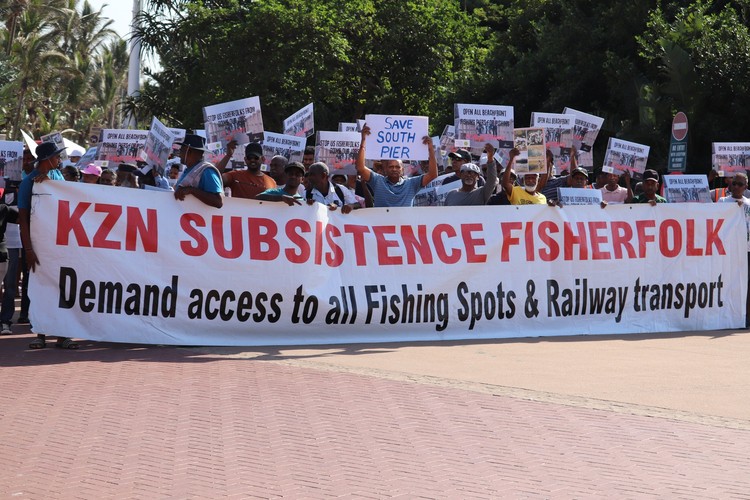
7 May 2024
Subsistence fishers marched from the Suncoast beach promenade to the Durban Amphitheatre to demand that they be allowed to fish at Durban’s piers. Photos: Nokulunga Majola
KwaZulu-Natal fishers are up in arms over the ban on fishing at most Durban piers.
According to the South Durban Environmental Alliance (SDEA), fishers have been denied access to beachfront piers since 2009 when renovations started for the soccer World Cup. Now fishers across KwaZulu-Natal want to reclaim these spaces.
Thirty-two-year-old Natasha Khan from Phoenix has been fishing with her husband since she was 19. “My husband and I used to fish together at night when he was not working. We mostly rely on the money from fish sales because his part time jobs don’t pay much,” said Khan.
She fishes at Snake Park — the only accredited fishing spot for subsistence fishing — and sells her catch for between R30 and R100, depending on size. She catches blacktail, grunter and salmon. Khan said her 12-year-old daughter joins them when she is not at school.
Khan was among about 100 fishers and their families who marched from the Suncoast beach promenade to the Durban Amphitheatre on 1 May.
Among the group’s main demands are that traditional fishing piers be opened to them immediately, and that security and police officers stop harassing them.
They are also calling on eThekwini Mayor Mxolisi Kaunda and Premier Nomusa Dube to call an urgent meeting to restore traditional fishing areas in the city.
The march last week was organised by the SDEA and the KZN Subsistence Fishing Forum. The Forum says it has more than 25,000 members from Hluhluwe to Port Edward.
Jefferey Naicker, 71, who has been fishing for 60 years, complained that Snake Park was not an ideal spot for fishing. “The place has too much sand.”
“All we want is to be allowed to fish and continue to make a living.”
John Peter Narayanasamy, chairman of the Forum, said that fishing at Snake Park was nearly impossible during low tide. “And when the tide is in, the water crashes over the pier, posing a threat to one’s safety. It also drenches the fisherfolk and washes away their belongings,” he said.
He said pier fishing allowed fishers to cast lines in deeper waters and catch a variety of fish. But he said security guards stationed at piers at night prevent fishers from gaining access.
The SDEA’s Janeira Reddy told GroundUp that since 2009, “about 200 to 300 fisherfolk have been arrested and fined”.
Responding to GroundUp’s questions, eThekwini municipality spokesperson Gugu Sisilana said the City had noted “terrible abuses” at the Bay, North, and Dairy beach piers. This, she said, had led to the prohibition of fishing at these spots.
She said transgressions of bylaws included littering, public drinking, assaults between fishermen, sleeping at the piers, and assaulting surfers with fishing equipment.
“These were raised numerous times with the concerned parties but there was no improvement. Most of the fishermen were also found to not be compliant in terms of the National Environmental Management Act and had no valid licences, catching undersized fish and exceeding the bag limit.”
Sisilana said fishing was still allowed at certain beaches and piers.
Peter Mbelengwa, spokesperson for the Department of Forestry, Fisheries and the Environment, said a Durban Bay Environmental Monitoring Committee had been established and would look into the grievances of the fishers and try improve their access to resources.